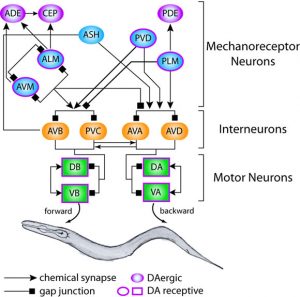
Another aspect of neuromodulation that fascinates us is the role of social experience in enacting innate behaviors. Innate behaviors involve a number of steps resulting in stereotyped motor responses. An interesting question is how does social experience modulate neural circuits underlying innate behaviors in organisms? In particular, we will focus on how mate-finding behavior is modulated by previous experience in C. elegans. Mate-finding using chemical cues involves a number of steps: a) orientation in the direction of the cue b) response to the cue and c) homing in on the cue. These events reflect an intricate interplay between sensory neurons and downstream interneurons that results in a directed motor output. We wish to understand the molecular and neural mechanisms by which organisms remember chemical cues from past experience and how that experience regulates response to new sets of cues.

